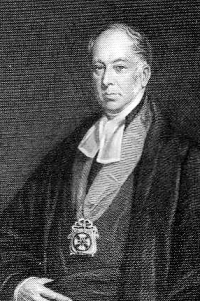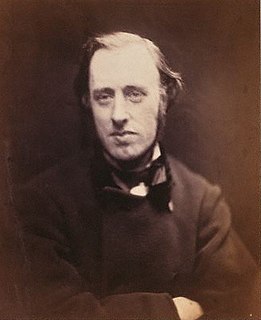Related Research Articles

Richard Whately was an English academic, rhetorician, logician, philosopher, economist, and theologian who also served as a reforming Church of Ireland Archbishop of Dublin. He was a leading Broad Churchman, a prolific and combative author over a wide range of topics, a flamboyant character, and one of the first reviewers to recognise the talents of Jane Austen.

William Edward Hartpole Lecky was an Irish historian, essayist, and political theorist with Whig proclivities. His major work was an eight-volume History of England during the Eighteenth Century.
Sir Thomas Wyse, an Irish politician and diplomat, belonged to a family claiming descent from a Devon squire, Andrew Wyse, who is said to have crossed over to Ireland during the reign of Henry II and obtained lands near Waterford, of which city thirty-three members of the family are said to have been mayors or other municipal officers.
The High Sheriff of County Galway was the Sovereign's judicial representative in County Galway. Initially an office for lifetime, assigned by the Sovereign, the High Sheriff became annually appointed from the Provisions of Oxford in 1258. Besides his judicial importance, he had ceremonial and administrative functions and executed High Court Writs.
William FitzGerald (1814–1883) was an Anglican bishop, first of Cork, Cloyne and Ross and then of Killaloe and Clonfert.

The Cambrian Archaeological Association was founded in 1846 to examine, preserve and illustrate the ancient monuments and remains of the history, language, manners, customs, arts and industries of Wales and the Welsh Marches and to educate the public in such matters. The association's activities include sponsoring lectures, field visits, and study tours; as well as publishing its journal, Archaeologia Cambrensis, and monographs. It also provides grants to support research and publications.
Claude Martin Blagden was an eminent Anglican bishop in the first half of the 20th century.
The High Sheriff of Galway Town was the Sovereign's judicial representative in the county of the Town of Galway. Initially an office for lifetime, assigned by the Sovereign, the High Sheriff became annually appointed from the Provisions of Oxford in 1258. Besides his judicial importance, he had ceremonial and administrative functions and executed High Court Writs.

Francis Thomas McDougall was the first Bishop of Labuan and Sarawak from 1849 to 1868.
John Gregg was an Anglican bishop.
William Edward Meade was a Bishop of Cork, Cloyne and Ross.
The Rt Rev Robert Fowler, DD, MA was an eminent Anglican bishop in the late eighteenth and early 19th centuries.
Nathaniel Alexander, was an Anglican Bishop in Ireland during the first half of the 19th century.
Edward Adderley Stopford (1810–1874) was an Irish Anglican priest.
Thomas Philip Le Fanu (1784–1845) was an Irish Dean in the first half of the 19th century. He was the son of Joseph Le Fanu and Alicia Sheridan, and the father of Joseph Sheridan Le Fanu. He married Emma Lucretia Dobbin.

Edward Newenham Hoare, a graduate of Trinity College, Dublin was an Irish Anglican priest: he was Archdeacon of Ardfert from 1836 to 1839, then Dean of Achonry from 1839 to 1850; and Dean of Waterford from then until his death.
Elizabeth Pope Whately was an English writer and the wife of Archbishop Richard Whately. She wrote and edited a number of fictional, religious and educational works, though little of her writing appeared explicitly under her own name.
Herbert Edward Whately MA Oxon was an Anglican priest: he was Archdeacon of Ludlow from 1939 to his death.
James Agar was a 19th-century Anglican priest in Ireland.
James Bardsley (1805–1886) was an English cleric of evangelical views.
References
- ↑ Handbook of British Chronology. Fryde, E.B.; Greenway, D.E.; Porter, S.; Roy, I.: Cambridge, CUP, 1996 ISBN 0-521-56350-X, 9780521563505
- ↑ A New History of Ireland. Moody, T.W.; Martin, F.X.; Byrne, F.J.; Cosgrove, A.: Oxford, OUP, 1976 ISBN 0-19-821745-5
- ↑ Fasti Ecclesiae Hibernicae: The succession of the prelates Volume 2. Cotton, H. pp. 220-221 Dublin, Hodges & Smith, 1848-1878
- ↑ Foster, Joseph (1888–1892). . Alumni Oxonienses: the Members of the University of Oxford, 1715–1886 . Oxford: Parker and Co – via Wikisource.
- ↑ The Gentleman's Magazine, vol 32, 1849, July-December
- ↑ "Ecclesiastical News. New Archdeacon of Ludlow". The Times (48407). London, England. 11 September 1939. p. 11.
- ↑ "Obituary". The Times (50938). London, England. 8 December 1947. p. 4.
| This article about a member of the Christian clergy in the United Kingdom is a stub. You can help Wikipedia by expanding it. |